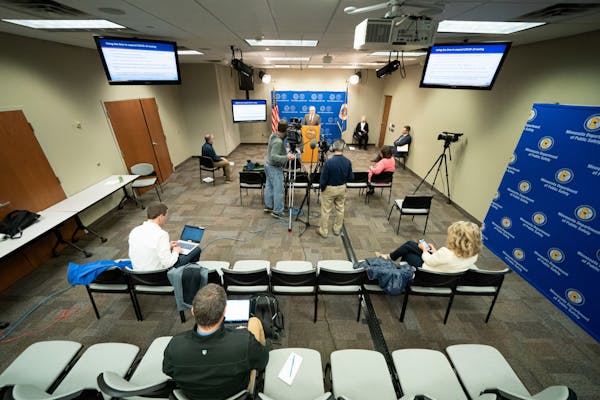As financial stress for hospitals and clinics builds due to COVID-19, health insurers said they are accelerating financial payments to health care providers.
Minnetonka-based UnitedHealth Group, which runs the nation's largest health insurance company, said this week it's providing nearly $2 billion in various types of funding including claims payments to medical and behavioral care providers.
On Wednesday, Eagan-based Blue Cross and Blue Shield of Minnesota, which is the largest carrier for state residents, said it's accelerating about $80 million in payments for providers that hit certain cost and quality goals, saying the money previously was scheduled to arrive in the fall.
Hospitals and clinics across the country have been stressed financially by the COVID-19 pandemic, as they try to prepare while seeing revenue plunge due to bans on elective surgeries and procedures.
"This is coming at an enormous cost to our hospitals," Mary Krinkie, vice president for government relations at the Minnesota Hospital Association said during a legislative hearing this month.
"It was a tough policy choice that we felt we had to make in order to conserve personal protective equipment," Krinkie said. But she added: "We have to protect our health care workers or we're going to lose this fight."
Several insurers said they are trying to make it easier for health care providers to get paid.
Minnetonka-based Medica said in a statement Wednesday that it's trying to reduce the administrative burden for physicians and facilities by suspending certain requirements for prior authorization and documentation. Premera Blue Cross, a health plan in the Pacific Northwest, said Wednesday it would provide up to $100 million in financial support in the form of advance payments of claims to medical, dental and behavioral health providers.
UnitedHealth Group said it's also providing up to $125 million in small-business loans to clinical groups that partner with OptumHealth, the company division that provides health care directly to patients. Blue Cross said it has removed prior authorizations for COVID-19 and many other treatments, and advanced payments to health care providers for certain care innovations.
The Minnesota Hospital Association said hospitals across the state are losing about $31 million per day in net revenue due to a statewide order in late March that halted most nonemergency medical procedures. Hospitals have supported the order as a way to conserve medical supplies for an expected surge of COVID-19 patients.
Minneapolis-based Fairview Health Services said Saturday that sharp revenue declines were prompting reduced hours for about 15% of all workers at the health system, including a request for some physicians to take furloughs.
Duluth-based Essentia Health said in a filing with bondholders this week that it expects a 20% to 40% drop in short-term revenue due to reductions in elective procedures and surgeries.
Earlier this week, Fitch Ratings lowered the outlook for St. Cloud-based CentraCare due to COVID-19 concerns. In response to the coronavirus pandemic, the health system has cut capital spending for the current fiscal year by about $25 million.
A spokeswoman for CentraCare noted that Fitch held steady its bond rating for the health system. The capital spending cuts "included a broad range of projects from equipment to software to facility refurbishments," CentraCare said in a statement.
Two private medical groups told the Star Tribune last week they had furloughed more than half their workers. Minneapolis-based Allina Health System said the patient census across 11 hospitals has dropped to just 40%, from a regional average of more than 75%, and surgical volumes are about 10% to 20% of normal.
For hospitals, financial stress from the shutdown of elective surgeries comes as large medical centers are investing to create spaces, add supplies and retrain staff for an expected surge of COVID-19 patients. Small hospitals in rural areas, meanwhile, are "pretty quiet right now," Krinkie said during last week's legislative hearing. She added that those medical centers might be called on to care for non-COVID patients.
Dr. Scott Jensen, R-Chaska, said during the hearing that he worried about the long-term viability of some rural hospitals.
"I think when we get on the other side of this crisis, I think a lot of those hospitals are going to have a hard time opening their doors ever again," Jensen said.
Christopher Snowbeck • 612-673-4744
Twitter: @chrissnowbeck

'Safe recovery sites' would offer syringes, naloxone and more to people using drugs. The plan could be in peril.
New Minnesota GOP leaders seek peace with party's anti-establishment wing

Who is Republican Lisa Demuth, Minnesota's first House speaker of color?

